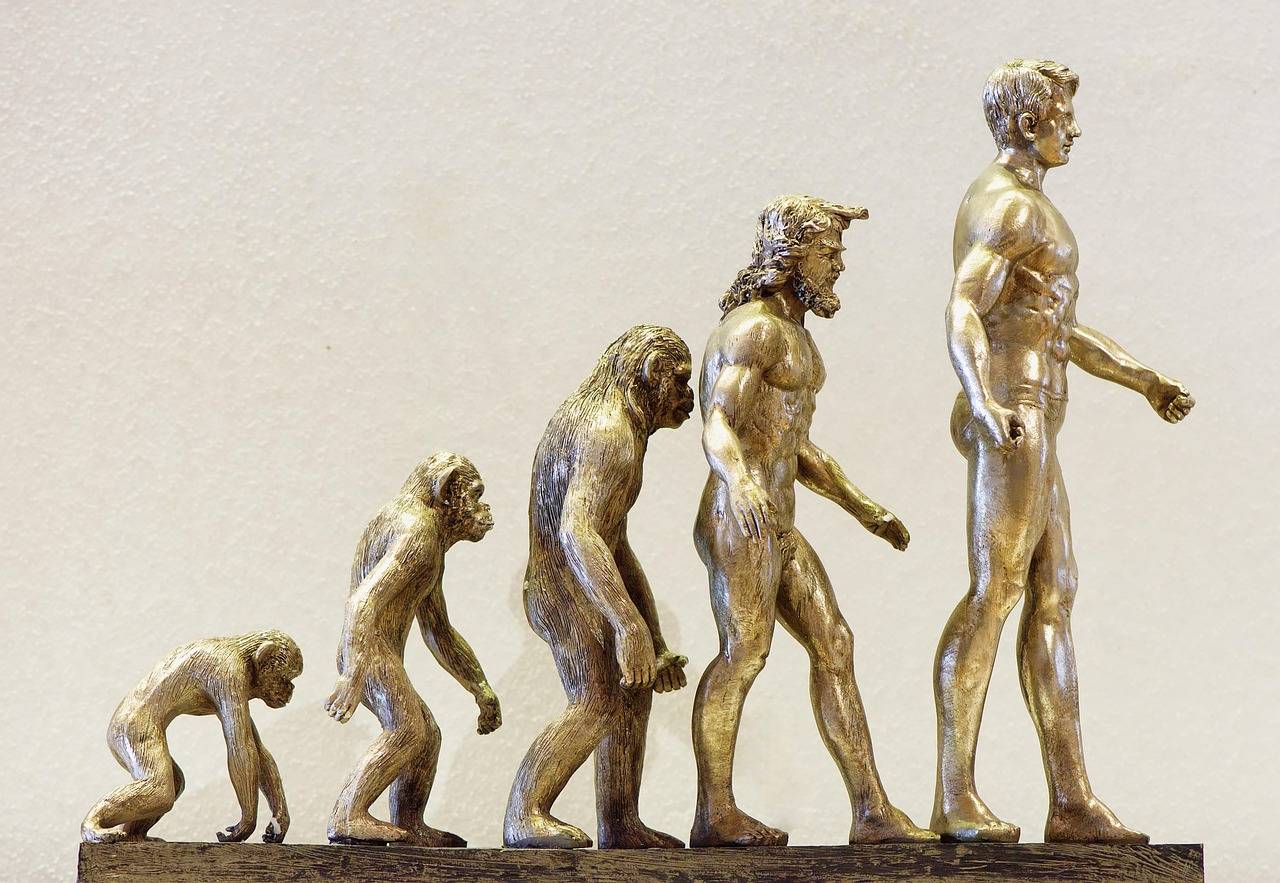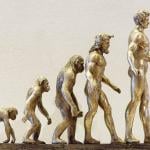
How Has Religion’s Evolution Debate Evolved?
THE RELIGION GUY’S ANSWER:
This month marks the 100th anniversary of the sensational “Monkey Trial,” a.k.a. the “Trial of the Century,” in Dayton, Tennessee. There, defendant John Scopes was convicted of violating a new state law that barred public schools from teaching evolution – specifically, “any theory that denies the story of the Divine Creation of man as taught in the Bible, and to teach instead that man has descended from a lower order of animals.”
Famous personalities guaranteed huge media interest. The American Civil Liberties Union, which recruited Scopes for a test case on academic freedom, brought in defense attorney Clarence Darrow, a religious agnostic. William Jennings Bryan, a devoutly conservative Presbyterian and Democratic nominee for president in 1896, 1900, and 1908, joined the prosecution. And the hundred-plus newspaper reporters in town included the Baltimore Sun’s influential H. L. Mencken.
His dispatches derided Bible Belt believers (“among the inferior orders of men”). The 1955 Broadway play and 1960 movie “Inherit the Wind,” a fictionalized riff on the trial, later perpetuated mild Menckenism. Historians note the ways media treatments distorted some of what actually occurred. Odd aspects of the Dayton showdown are depicted in this centennial assessment by The Religion Guy: https://religionunplugged.com/news/100-years-since-the-scopes-trial-evolution-religion-and-americas-classroom-conflicts/
“Survival of the Fittest”
Writers routinely miss that Bryan, a left-wing populist in politics, was motivated in part to fight “social Darwinism,” which applied evolutionary “survival of the fittest” to human politics and economics. His written summation for the trial, never delivered, warned that Darwinism fosters “the savage custom of eliminating the weak so that only the strong will survive,” and “drags mankind down to the level of the brute.”
The trial pretty much originated American “culture wars” decades before that phrase came into common use. Though Tennessee’s law was not repealed till 1967, after 1925 elitist commentators believed the celebrated trial defeated fundamentalism’s literal interpretation of the creation account in the Bible’s Book of Genesis.
According to Charles Darwin’s theory, Earth’s countless species, humanity included, resulted from “natural selection” of favorable genetic mutations, which necessarily required vast eons of time. Did monkeys and primates give rise to humanity? Or were Adam and Eve real individuals God created as humanity’s ancestors? Was a “young Earth,” perhaps 10,000 years old, far too short a time for evolution to work? Did God create the universe in six literal days? Such questions persist in the 21st Century.
The Catechism of the Catholic Church requires no particulars on evolution, but certain U.S. Protestant denominations affirm literalism. The Lutheran Church–Missouri Synod (with 1.8 million members) credo says God created heaven and earth “in six days,” not over “immense periods of time.” The Wisconsin Evangelical Lutheran Synod (408,000 members) and Seventh-day Adventist Church (1.3 million members) hold similar beliefs, as do other conservative Protestants.
37% and 10,000 Years
So with a plurality of Americans. A 2024 Gallup Poll reported 37% believe “God created human beings pretty much in their present form at one time within the last 10,000 years or so.” Another 34%, also religious, think “human beings have developed over millions of years from less advanced forms of life, but God guided this process.” Then 24% say “God had no part in this process.”
Laws against teaching evolution in public schools were abolished by a unanimous U.S. Supreme Court in the 1968 Epperson v. Arkansas decision, on grounds that they were an “establishment of religion” by government, which the Constitution forbids.
A “creationist” movement arose in the 1960s and 1970s to promote “creation science” over against Darwinism, with belief in a recent “young earth” and usually six literal creation “days”. Such groups sought “equal time” in public classrooms to “teach the controversy.” But in 1987, the Supreme Court in Edwards v. Aguillard outlawed by 7-2 Louisiana’s allowance for “creation science,” as an “establishment of religion.”
As with many evangelicals today, by this definition Bryan was no “creationist.” Darrow sought to ridicule the literalists by calling Bryan as an expert witness on the Bible (see transcripts online). Bryan testified that the six Genesis “days” were non-literal time “periods” and that God might have created Earth “in 6 million years or in 600 million years.” Geologists today put the age of planet Earth at 4.5 billion years, using radiometric dating and other techniques originated in Bryan’s era.
“Intelligent Design”
Next came the “intelligent design” movement, sparked by law professor Phillip Johnson’s 1991 “Darwin on Trial.” Proponents shun “young earth” literalism and religious language but question Darwinism scientifically. They figure only a superior mind (implicitly, God) could produce nature’s complexities. Advocates include Ph.D.-level scholars with Seattle’s Discovery Institute (www.discovery.org/id/), e.g. microbiologist Michael Behe, mathematician William Dembski and Stephen Meyer, who studies the history and philosophy of science. In 2005, a Pennsylvania federal court barred “intelligent design” from inclusion in science classes, once again on “establishment” grounds.
While literal “creationists” persist, other Bible-believing Christian conservatives have been rethinking the Bible and evolution.
The American Scientific Affiliation (https://network.asa3.org/) unites professionally trained scientists who accept “orthodox Christianity” in historic creeds, and “the divine inspiration, trustworthiness and authority of the Bible in matters of faith and conduct.” The organization encourages “honest and open studies of both Scripture and nature,” and its 1,000-plus members express varied evolutionary viewpoints.
Scientists with Reasons to Believe (https://reasons.org/), founded in 1986 by astrophysicist Hugh Ross, promote “old earth creationism,” which critiques evidences for Darwinism, accepts the Genesis account, but sees Earth as vastly ancient and refutes “young earth creationism” with its brief chronology and literal “days.”
BioLogos (https://biologos.org/) was founded in 2009 by Francis Collins, an evangelical convert who led the Human Genome Project that mapped all the genes in homo sapiens, then directed the National Institutes of Health. The organization resulted from Collins’s “The Language of God: A Scientist Presents Evidence for Belief” (www.simonandschuster.com/books/The-Language-of-God/Francis-S-Collins/9781416542742/). BioLogos urges evangelicals to join other Christians and embrace “evolutionary creation” or “theistic evolution,” in which Darwinian processes are God’s method in creation.
Humans Outside Eden?
Less conventional is S. Joshua Swamidass, a Christian and “computational biology” professor at Washington University. His “The Genealogical Adam and Eve: The Surprising Science of Universal Ancestry” (www.ivpress.com/the-genealogical-adam-and-eve/) finds evolution fully compatible with a real Adam and Eve if we think of family trees, not genetics. In his scenario, humanity’s divinely created first parents could have interbred with humans outside Eden, as Genesis itself suggests.
Swamidass’s book comes from a major evangelical publisher, InterVarsity Press, which also markets radical revisionism from John H. Walton, who taught Old Testament for four decades at Moody Bible Institute and Wheaton College. His controversial ideas are proposed in “The Lost World of Genesis One” and “The Lost World of Adam and Eve,” followed up this April by “New Explorations in the Lost World of Genesis: Advances in the Origins Debate.” (www.ivpress.com/Search?q=%22Lost+World%22+series/).
Walton professes belief in the complete verbal authority and “inerrancy” of the Bible but says we must correctly interpret what the author(s) affirmed for the original readers. Relying in part on ancient creation stories from Israel’s neighbors, Walton concludes Genesis meant chiefly to convey God’s work in ordering the universe, with humanity playing a role. Whatever the history of human origins, Adam and Eve are literary archetypes intended to teach what all humans are.
Moving beyond science to educational and cultural controversy, there’s this by eminent Protestant philosopher Alvin Plantinga: “Where the Conflict Really Lies: Science, Religion and Naturalism.” (https://academic.oup.com/book/5857?/). He insists that science and faith have deep concord despite seeming superficial conflict. Problems arise with the implicitly anti-religious assumption that evolution means natural processes are “unguided” and lack any meaning or “purpose.” He insists that exceeds what scientific evidence can ever know, which must be made clear in public classrooms.











